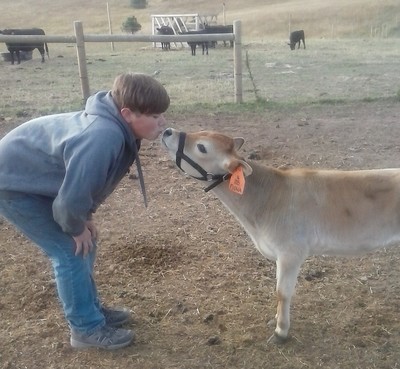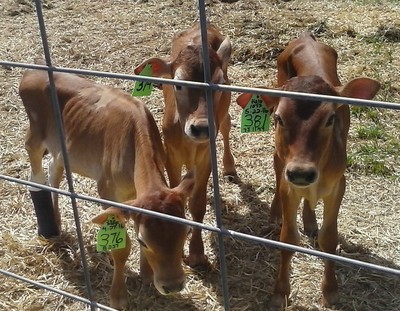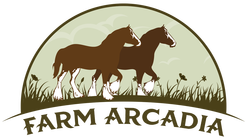Dairy Cattle
Fewest in number but highest in production are our dairy cows. Jerseys are usually a familiar golden-colored small dairy breed that produces milk so rich that sometimes blobs of butter can be found floating on the top. The cows are very gentle, good mothers, and excellent family cows. We sell offspring of our own cows, but we also purchase "a load" of calves in the spring, transport them to the area, and sell them in our local market because some years is is so difficult to find healthy A2A2 jersey calves.
In case you aren't familiar with terminology, an intact male is a bull, a female that has calved is a cow, a young female before calving is a heifer, a baby is a calf (bull calf, heifer calf), and a castrated male is a steer. Where "cow" refers to a mature female, an animal of unknown gender or a group of them are called cattle. We wean calves at two months or more when their rumens are developed enough to digest enough hay and grain to keep them healthy and comfortable. If we are not milking their mothers twice a day, we may leave calves on for longer.
We breed our dairy cattle for many favorable qualities including a beta-casein profile of A2A2, which some people find does to cause problems for them compared to the A1 alternative. If you are unfamiliar with this characteristic, beta-casein refers to the main milk protein, which is about 80% of the total protein in milk. Cows inherit two genes for this protein that are identified as either A1 or A2. A cow will produce all A2 (A2A2 genes), all A1 (A1A1 genes - most common), or a some of both (A1A2 genes). A2 is the "old" form of the protein, and A1 is a mutation that has become more common than the original among high-producing cows such as those used on commercial dairies.
Why does this matter? The A1 protein breaks down differently when digested and one of the segments from the breakdown does not naturally occur nor is it naturally used by the human body. One of these A1 segments is suspected to contribute to diabetes, heart disease, autism, schizophrenia, and other non-communicable diseases. There is a lot of information about this on the internet if you'd like to research the most current studies that are underway, but be warned there are also a lot of false claims and hype that may not be real. Our purpose in breeding for A2A2 milk is in hopes it is healthier for and more easily digested by our family and customers. Goat milk and ewe's milk, which are both known as more digestable than cow's milk, are all A2A2 - the A1 mutation is only among cows.
We feed our dairy cattle on pasture from spring through fall with free choice quality alfalfa and alfalfa mix hay. They also receive regular minerals, produce from our farm, free access to fresh water, and baking soda. We regularly vaccinate, supplement, and deworm with dairy-approved anti-helminth when parasite load is heavy.
In case you aren't familiar with terminology, an intact male is a bull, a female that has calved is a cow, a young female before calving is a heifer, a baby is a calf (bull calf, heifer calf), and a castrated male is a steer. Where "cow" refers to a mature female, an animal of unknown gender or a group of them are called cattle. We wean calves at two months or more when their rumens are developed enough to digest enough hay and grain to keep them healthy and comfortable. If we are not milking their mothers twice a day, we may leave calves on for longer.
We breed our dairy cattle for many favorable qualities including a beta-casein profile of A2A2, which some people find does to cause problems for them compared to the A1 alternative. If you are unfamiliar with this characteristic, beta-casein refers to the main milk protein, which is about 80% of the total protein in milk. Cows inherit two genes for this protein that are identified as either A1 or A2. A cow will produce all A2 (A2A2 genes), all A1 (A1A1 genes - most common), or a some of both (A1A2 genes). A2 is the "old" form of the protein, and A1 is a mutation that has become more common than the original among high-producing cows such as those used on commercial dairies.
Why does this matter? The A1 protein breaks down differently when digested and one of the segments from the breakdown does not naturally occur nor is it naturally used by the human body. One of these A1 segments is suspected to contribute to diabetes, heart disease, autism, schizophrenia, and other non-communicable diseases. There is a lot of information about this on the internet if you'd like to research the most current studies that are underway, but be warned there are also a lot of false claims and hype that may not be real. Our purpose in breeding for A2A2 milk is in hopes it is healthier for and more easily digested by our family and customers. Goat milk and ewe's milk, which are both known as more digestable than cow's milk, are all A2A2 - the A1 mutation is only among cows.
We feed our dairy cattle on pasture from spring through fall with free choice quality alfalfa and alfalfa mix hay. They also receive regular minerals, produce from our farm, free access to fresh water, and baking soda. We regularly vaccinate, supplement, and deworm with dairy-approved anti-helminth when parasite load is heavy.


